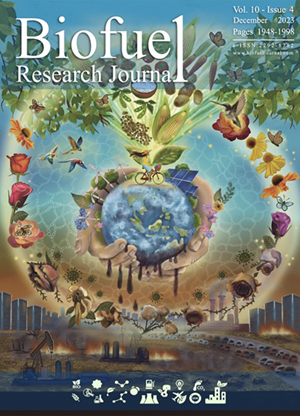Fueling the future; plant genetic engineering for sustainable biodiesel production
IF 14.4
Q1 ENERGY & FUELS
引用次数: 21
Abstract
Biodiesel has huge potentials as a green and technologically feasible alternative to fossil diesel. However, biodiesel production from edible oil crops has been widely criticized while nonedible oil plants are associated with some serious disadvantages, such as high cost, low oil yield, and unsuitable oil composition. The next generation sequencing (NGS), omics technologies, and genetic engineering have opened new paths toward achieving high performance-oil plants varieties for commercial biodiesel production. The intent of the present review paper is to review and critically discuss the recent genetic and metabolic engineering strategies developed to overcome the shortcoming faced in nonedible plants, including Jatropha curcas and Camelina sativa, as emerging platforms for biodiesel production. These strategies have been looked into three different categories. Through the first strategy aimed at enhancing oil content, the key genes involved in triacylglycerols (TAGs) biosynthesis pathway (e.g., diacylglycerol acyltransferase (DGAT), acetyl-CoA carboxylase (ACCase), and glycerol‐3‐phosphate dehydrogenase (GPD1)), genes affecting seed size and plant growth (e.g., transcription factors (WRI1), auxin response factor 19 (ARF19), leafy cotyledon1 (LEC1), purple acid phosphatase 2 (PAP2), G-protein c subunit 3 (AGG3), and flowering locus T (FT)), as well as genes involved in TAGs degradation (e.g., sugar-dependent protein 1 triacylglycerol lipase (SDP1)) have been deliberated. While through the second strategy targeting enhanced oil composition, suppression of the genes involved in the biosynthesis of linoleic acids (e.g., fatty acid desaturase (FAD2), fatty acid elongase (FAE1), acyl-ACP thioesterase (FATB), and ketoacyl-ACP synthase II (KASII)), suppression of the genes encoding toxic metabolites (curcin precursor and casbene synthase (JcCASA)), and finally, engineering the genes responsible for the production of unusual TAGs (e.g., Acetyl-TAGs and hydroxylated fatty acids (HFA)) have been debated. In addition to those, enhancing tolerance to biotic (pest and disease) and abiotic (drought, salinity, freezing, and heavy metals) stresses as another important genetic engineering strategy to facilitate the cultivation of nonedible oil plants under conditions unsuitable for food crops has been addressed. Finally, the challenges faced prior to successful commercialization of the resultant GM oil plants such have been presented.为未来加油;可持续生物柴油生产的植物基因工程
生物柴油作为一种绿色且技术可行的化石柴油替代品,具有巨大的潜力。然而,食用油料作物生产生物柴油受到了广泛的批评,而非食用油料作物生产生物柴油存在成本高、出油率低、油成分不合适等严重缺点。下一代测序(NGS)、组学技术和基因工程为实现用于商业生物柴油生产的高性能油料植物品种开辟了新的途径。本综述的目的是回顾和批判性地讨论最近开发的遗传和代谢工程策略,以克服非食用植物面临的缺点,包括麻疯树和亚麻荠,作为生物柴油生产的新兴平台。这些策略被分为三个不同的类别。通过提高含油量的第一个策略,涉及三酰基甘油(TAGs)生物合成途径的关键基因(如二酰基甘油酰基转移酶(DGAT)、乙酰辅酶a羧化酶(ACCase)和甘油- 3 -磷酸脱氢酶(GPD1)),影响种子大小和植物生长的基因(如转录因子(WRI1)、生长素反应因子19 (ARF19)、叶子叶1 (LEC1)、紫色酸性磷酸酶2 (PAP2)、g -蛋白c亚基3 (AGG3)和开花位点T (FT)),以及参与标签降解的基因(例如,糖依赖性蛋白1三酰基甘油脂肪酶(SDP1))已被审议。而通过第二种策略,针对增强的油成分,抑制参与亚油酸生物合成的基因(如脂肪酸去饱和酶(FAD2)、脂肪酸延长酶(FAE1)、酰基- acp硫酯酶(FATB)和酮酰基- acp合成酶II (KASII)),抑制编码有毒代谢物的基因(curcin前体和casbene合成酶(JcCASA)),最后,设计负责产生异常标签的基因(如:乙酰基标签和羟基化脂肪酸(HFA)一直存在争议。除此之外,提高对生物(病虫害)和非生物(干旱、盐碱、冰冻和重金属)胁迫的耐受性是另一个重要的基因工程策略,以促进在不适合粮食作物的条件下种植非食用油类植物。最后,所面临的挑战,在成功的商业化所产生的转基因油料工厂已经提出。
本文章由计算机程序翻译,如有差异,请以英文原文为准。
求助全文
约1分钟内获得全文
求助全文
来源期刊

Biofuel Research Journal-BRJ
ENERGY & FUELS-
CiteScore
22.10
自引率
1.50%
发文量
15
审稿时长
8 weeks
期刊介绍:
Biofuel Research Journal (BRJ) is a leading, peer-reviewed academic journal that focuses on high-quality research in the field of biofuels, bioproducts, and biomass-derived materials and technologies. The journal's primary goal is to contribute to the advancement of knowledge and understanding in the areas of sustainable energy solutions, environmental protection, and the circular economy. BRJ accepts various types of articles, including original research papers, review papers, case studies, short communications, and hypotheses. The specific areas covered by the journal include Biofuels and Bioproducts, Biomass Valorization, Biomass-Derived Materials for Energy and Storage Systems, Techno-Economic and Environmental Assessments, Climate Change and Sustainability, and Biofuels and Bioproducts in Circular Economy, among others. BRJ actively encourages interdisciplinary collaborations among researchers, engineers, scientists, policymakers, and industry experts to facilitate the adoption of sustainable energy solutions and promote a greener future. The journal maintains rigorous standards of peer review and editorial integrity to ensure that only impactful and high-quality research is published. Currently, BRJ is indexed by several prominent databases such as Web of Science, CAS Databases, Directory of Open Access Journals, Scimago Journal Rank, Scopus, Google Scholar, Elektronische Zeitschriftenbibliothek EZB, et al.
 求助内容:
求助内容: 应助结果提醒方式:
应助结果提醒方式:


